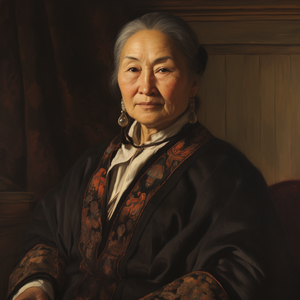Guli Temir: Difference between revisions
Jump to navigation
Jump to search
No edit summary |
No edit summary |
||
| (2 intermediate revisions by the same user not shown) | |||
| Line 2: | Line 2: | ||
| name = Guli Temir | | name = Guli Temir | ||
| honorific_suffix = | | honorific_suffix = | ||
| image = | | image = guli_temir.png | ||
| caption = | | caption = Portrait of Temir in 1831 | ||
| birth_date = May 1, | | birth_date = May 1, 1760 | ||
| birth_place = [[ | | birth_place = [[Baotu]], [[Untsangasar]] | ||
| death_date = October 16, | | death_date = October 16, 1846 | ||
| death_place = [[]], [[Untsangasar]] | | death_place = [[Ka'ankhot]], [[Untsangasar]] | ||
| resting_place = | | resting_place = | ||
| residence = | | residence = | ||
| nationality = | | nationality = [[Untsangasar|Untsangasari]], [[Chuyan People|Chuyan]] | ||
| spouse = | | spouse = | ||
| children = | | children = | ||
| father = Anil Temir | | father = Anil Temir | ||
| mother = | | mother = Suchi Ilmaj | ||
| relatives = | | relatives = | ||
| module = | | module = | ||
| Line 29: | Line 29: | ||
}} | }} | ||
'''Guli Temir''' was a 18th and 19th century scholar and reformer in | '''Guli Temir''' was a 18th and 19th century scholar and reformer in the Khaganate of [[Untsangasar]]. The only child of a cadet branch of a noble family, Guli was doted on by her father, who encouraged her love of reading and her interest in burgeoning sciences. She would go on to become a preeminent philosopher and official in the still-young state, helping to spread the ideas that would eventually lead to the [[Khuvirgalt]] in 1834 and its attendant reforms. Consequently, Temir is often considered to be one of the spiritual and intellectual founders of the modern Untsangasari state. | ||
[[Category: Ajax]] | [[Category: Ajax]] | ||
[[Category: | [[Category: Untsangasar]] | ||
Latest revision as of 20:30, 1 July 2023
Guli Temir | |
|---|---|
 Portrait of Temir in 1831 | |
| Born | May 1, 1760 |
| Died | October 16, 1846 |
| Nationality | Untsangasari, Chuyan |
| Parents |
|
Guli Temir was a 18th and 19th century scholar and reformer in the Khaganate of Untsangasar. The only child of a cadet branch of a noble family, Guli was doted on by her father, who encouraged her love of reading and her interest in burgeoning sciences. She would go on to become a preeminent philosopher and official in the still-young state, helping to spread the ideas that would eventually lead to the Khuvirgalt in 1834 and its attendant reforms. Consequently, Temir is often considered to be one of the spiritual and intellectual founders of the modern Untsangasari state.